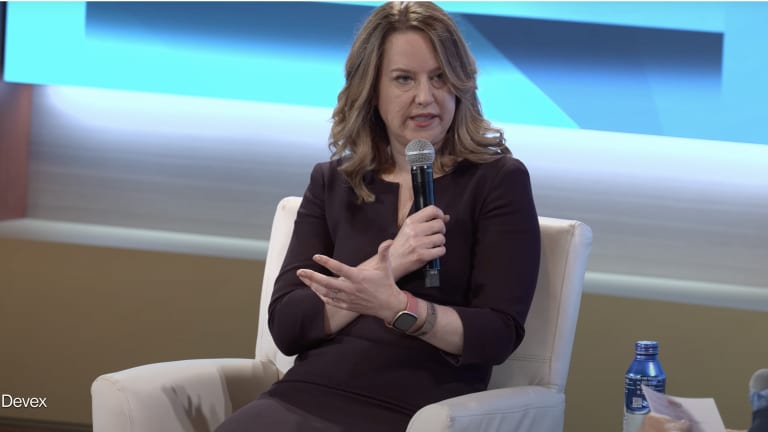
Worldwide displacement hit an all-time high in 2015, affecting more than 60 million people, according to United Nations Secretary-General Ban Ki-moon. This rise in global mobility has contributed to migration becoming a priority for the global development community — an ever-evolving situation that has resulted in a sea change in international policy and relations. And all within the context of the ratification of the Sustainable Development Goals, where migration and human mobility were included in four of the 17 goals.
With specific targets under discussion, financing being earmarked and policy approaches debated, the complexity of a fluid situation continues to evolve — as does the conversation.
Changing the narrative
To delve into arguably the most pressing issue of our time, throughout March Devex and our #AcrossBorders partners will take a closer look at migration, internal and external displacement, the influx of migrants to developed countries, as well as providing the latest updates on the Syria refugee crisis.
Together we will explore what a successful future looks like in terms of global security, development and humanitarian work, exploring human migration and the journey to a secure future.
#AcrossBorders will offer an opportunity to analyze the root causes of movement, the journey set in motion, and opportunities to build resilient and stable communities that can thrive economically and socially amid rapid growth and change. Over four weeks we will provide a platform to explore the evolution of the current migration crisis and identify solutions and best practices needed for effective interventions — today and in the future.
Along with our partners we will map the migratory journey, focusing on a different theme for each #AcrossBorders week:
Week One: Origins
Read our stories from Week One:
► Can we get smarter at preventing people from fleeing?
► Toward WHS 2016: The world must step up its political commitment
► Forced displacement and resilience in an age of mobility
► Pharmaceutical companies donating medicines in crisis situations
Launching March 1, we will identify what factors might cause the movement of people, outlining some of the key steps that lie ahead to more effectively prevent displacement.
How can we improve the methodology for understanding the causes and drivers of displacement, and promote cross-sector collaboration? What innovative community developments might prevent brain drain? And what can governments do in noncrisis settings to ensure more stable populations?
Throughout the week we will be discussing all this and more as we seek to explore the origins of crisis and displacement.
Week Two: The journey
Launching March 8, we will explore some of the practical strategies for aid workers engaging with mobile populations.
In the midst of the largest refugee crisis since World War II, governmental and nongovernmental actors certainly have their work cut out for them. With limited resources and an ever growing number of asylum-seekers with numerous needs, humanitarians and government authorities face myriad challenges.
What are the health, nutrition, education and security implications of such a journey? How does the family dynamic shift? And in what are ways can smart infrastructure ease urbanization challenges?
From strategies and innovations looking at how development cooperation and humanitarian aid actors are working to ensure a coherent response, throughout this week we will delve into some of the most pressing issues affecting communities on the move.
Week Three: The destination
Launching March 15, we will investigate the efficacy of the international response to crisis, funding gaps and potential funding streams, knowledge sharing and other resources that could be made available to address present gaps.
What are the lessons learned that previous migrant communities can share? How easily can best practices be replicated? And what can technological innovation and logistical support do to help address the challenges posed by current crises?
Throughout the week we will share examples of collaboration among organizations from both public and private sectors.
Week Four: The road ahead
Launching March 22, we will challenge the imagination of the global development and humanitarian aid community to think critically about what is needed to build a stable and successful future.
How should we structure resettlement policies from country to country? What does the movement of populations mean for global security in the coming decades? What does our world look like in 2050 based on current migration commitments?
Throughout the week we will explore what the mass movement of populations means for the work of global development practitioners and aid workers, what effective support really means in practice, and what role governmental authorities and nongovernmental organizations can play to smooth the transition of refugees into the host country setting.
Join us
The monthlong #AcrossBorders conversation will challenge the traditional narrative on migration, bringing to the table insights from a range of development and humanitarian aid professionals and practitioners, policy experts and political commentators.
Stay tuned for thought-provoking articles and analysis from Devex reporters and correspondents, together with insightful guest commentary, exclusive video interviews and features, as well as a series of engaging online events to amplify this truly global conversation. We invite you to join us.
Across Borders is a monthlong online conversation hosted by Devex and partners — World Vision, the European Commission's Humanitarian Aid and Civil Protection department, the U.S. nonprofit partner of the International Organization for Migration and United Nations Volunteers — to analyze and amplify the discussion on global migration and current refugee crises through the lens of global security, development cooperation and humanitarian aid work, and more. Visit the campaign site and join the conversation on social media tagging @devex and #AcrossBorders.
Search for articles
Most Read
- 1
- 2
- 3
- 4
- 5









